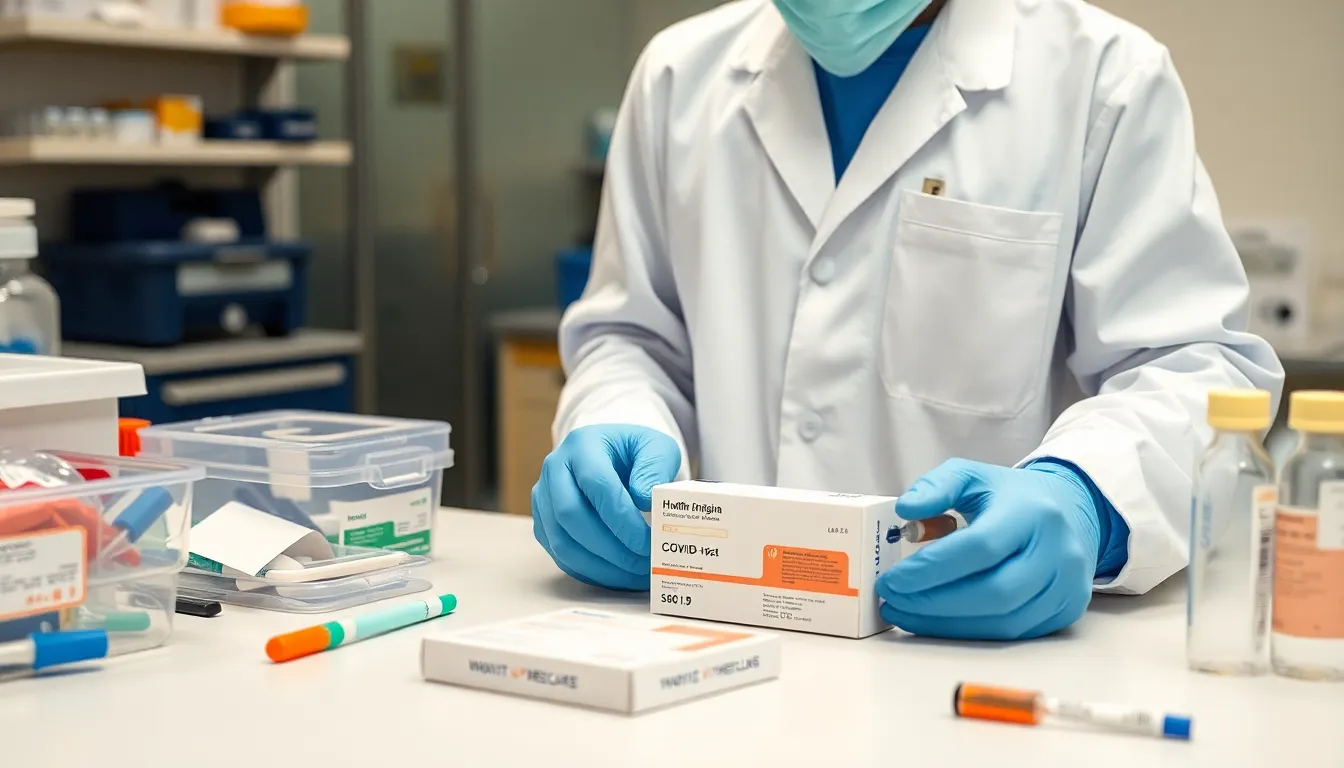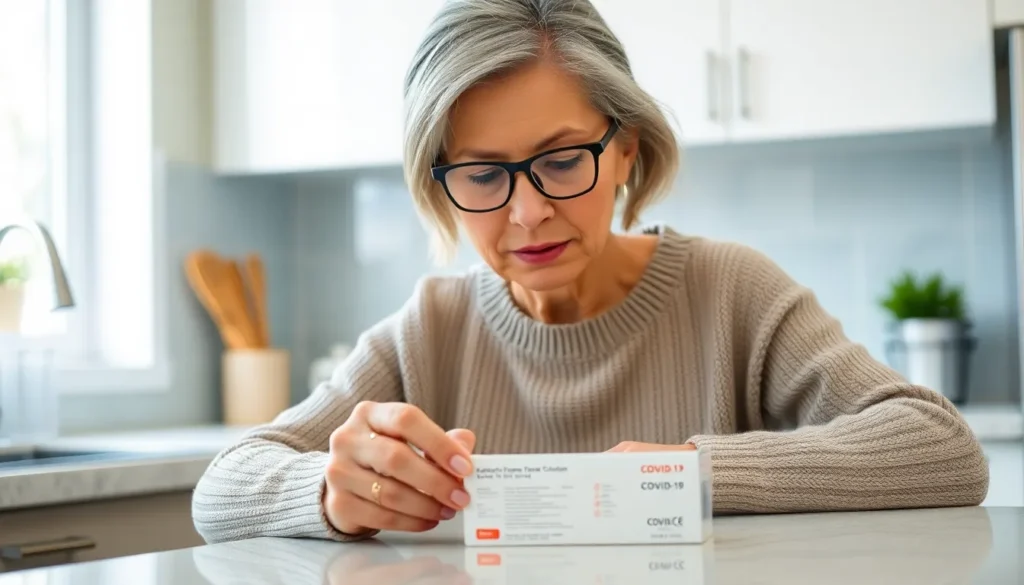As the world continues to navigate the complexities of the COVID-19 pandemic, many people are concerned about the validity of their home testing kits. Recently, health authorities announced an extension of the expiration dates for certain COVID tests, bringing relief to those who may have stockpiled tests or are unsure about their current kits’ usability.
This extension not only helps reduce waste but also ensures that individuals can continue to monitor their health effectively. Understanding the implications of this change is crucial for anyone relying on these tests for peace of mind and safety. As the situation evolves, staying informed about testing options and guidelines is more important than ever.
Table of Contents
ToggleUnderstanding Covid Test Expiration Dates
Monitoring expiration dates for COVID-19 tests is crucial for ensuring test reliability and accuracy. Extended expiration dates offer clarity for consumers, enabling them to use tests that remain effective beyond initial estimates.
Importance of Expiration Dates
Expiration dates signify the period during which testing kits maintain their advertised performance and reliability. Tests beyond their expiration dates may yield inaccurate results, leading to misinterpretations regarding one’s health status. Health authorities prioritize expired tests as potentially unreliable, underscoring the need for up-to-date usage information. Understanding these dates helps individuals manage their home testing resources effectively.
Factors Influencing Expiration Dates
Expiration dates are influenced by several factors, including:
- Storage Conditions: Tests must be stored at specific temperatures and away from humidity to maintain efficacy.
- Manufacturing Date: The initial production date impacts the shelf life, dictating how long a test kit maintains its intended performance.
- Kit Components: The stability of active ingredients within the test kits can affect longevity, necessitating regular evaluations of individual components.
- Regulatory Assessment: Testing kits undergo assessments by health authorities, determining how long they remain reliable based on scientific data.
Comprehending these factors empowers consumers to discern when tests remain valid and usable, fostering better health decisions amid the ongoing pandemic.
Recent Changes in Covid Test Expiration Dates

Recent modifications have occurred regarding expiration dates for specific COVID-19 home testing kits. Health authorities announced these extensions to aid consumers in effectively managing their testing resources.
Announcement of Extensions
Health authorities have communicated the extension of expiration dates for various COVID-19 testing kits, including those produced by major manufacturers. These announcements clarify that certain kits can be used beyond their originally stated expiration dates. The Food and Drug Administration (FDA) and the Centers for Disease Control and Prevention (CDC) provided updated guidance, reassuring the public about the continued reliability of these tests when stored correctly. Manufacturers will update labeling to reflect the new expiration dates, reinforcing compliance with regulatory standards.
Impact on Consumers and Healthcare Providers
Consumers benefit significantly from extended expiration dates, as they can utilize tests that remain valid longer than anticipated. This adjustment helps reduce waste associated with expired kits and promotes ongoing health monitoring. Healthcare providers also see advantages through better resource management, allowing them to support patients effectively. Accessible and reliable testing remains crucial for monitoring COVID-19, especially during variants’ emergence. Understanding expiration dates empowers consumers to make informed decisions, ensuring accurate testing outcomes and supporting public health initiatives.
Implications of Extended Expiration Dates
Extended expiration dates for COVID-19 testing kits significantly impact accessibility and safety for consumers while raising important considerations for their usage.
Benefits for Accessibility
Extended expiration dates enhance accessibility for consumers facing ongoing challenges with test availability. Longer validity allows individuals to utilize tests already in their possession, reducing panic buying and encouraging sustained health monitoring. Tests that remain effective for extended periods help mitigate waste, contributing to more sustainable health practices. Furthermore, consumers can ensure they’re prepared if the need for testing arises, as stockpiled tests hold reliability beyond initial expectations.
Concerns and Considerations
While extended expiration dates present benefits, they also prompt concerns regarding the accuracy and reliability of tests used beyond their original date. Consumers need to remain vigilant about storage conditions and any visible damage to kits. Regular checks on expiration dates and maintaining awareness of manufacturer guidelines are essential. If consumers notice changes in packaging or hear reports of potential errors associated with prolonged usage, they should consult health authorities to ensure continued testing reliability. Heightened awareness facilitates informed decision-making and promotes public health safety, particularly as new variants of COVID-19 emerge.
Best Practices for Using Extended Tests
Using COVID-19 tests with extended expiration dates requires careful attention to storage and result interpretation for maximum efficacy.
Storage Recommendations
Store COVID-19 tests in a cool, dry place away from direct sunlight. Ensure temperatures remain stable, ideally between 59°F and 86°F (15°C and 30°C). Protect tests from excessive moisture or humidity to maintain their integrity, as fluctuations can compromise accuracy. Regularly check supplies and avoid exposing kits to extreme temperatures. Always refer to the specific manufacturer’s guidelines for any additional storage instructions.
Interpreting Test Results
Understand the expiration date as the reliable period for a test’s accuracy. Tests used beyond this date may produce false negatives or positives, affecting decisions regarding isolation or further testing. Compare test lines carefully; a faint line may indicate a positive result, whereas no line suggests negative results. Consult manufacturer instructions for detailed result interpretation and consider retesting if any doubts arise. Trust the clarity of results derived from tests within their extended validity, keeping personal health safety as the priority.
The extension of COVID-19 test expiration dates marks a significant step toward enhancing public health safety and accessibility. By allowing individuals to use their home testing kits beyond initial estimates, health authorities are helping to reduce waste and promote ongoing health monitoring.
Consumers are encouraged to remain vigilant about storage conditions and to consult manufacturer guidelines for optimal test performance. This proactive approach not only supports informed decision-making but also contributes to the broader public health effort as new variants emerge. Staying informed about testing options and expiration dates ensures that everyone can effectively manage their health resources in these challenging times.




